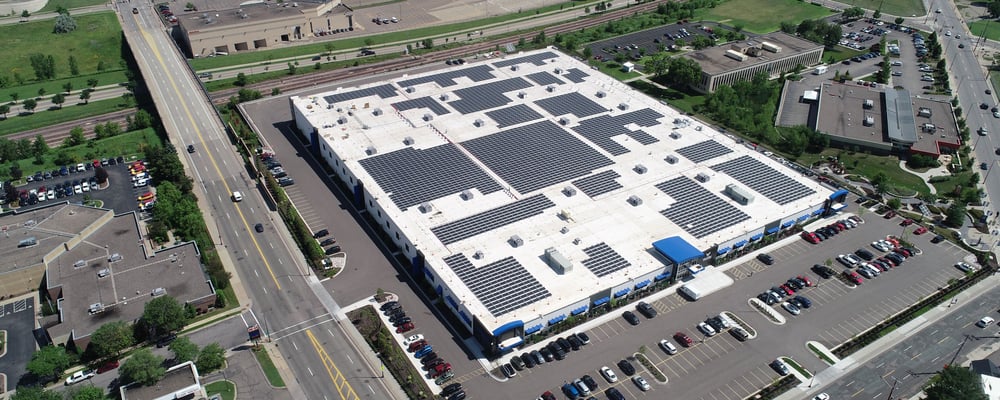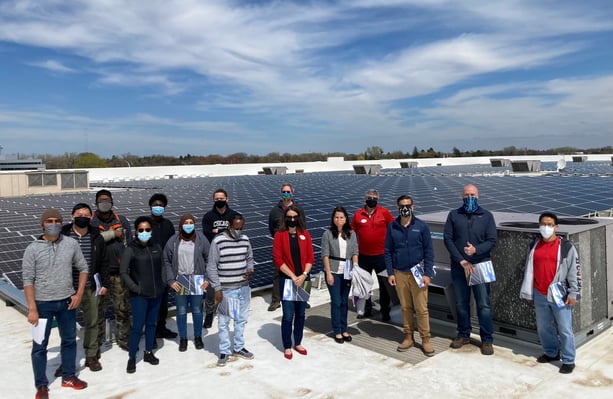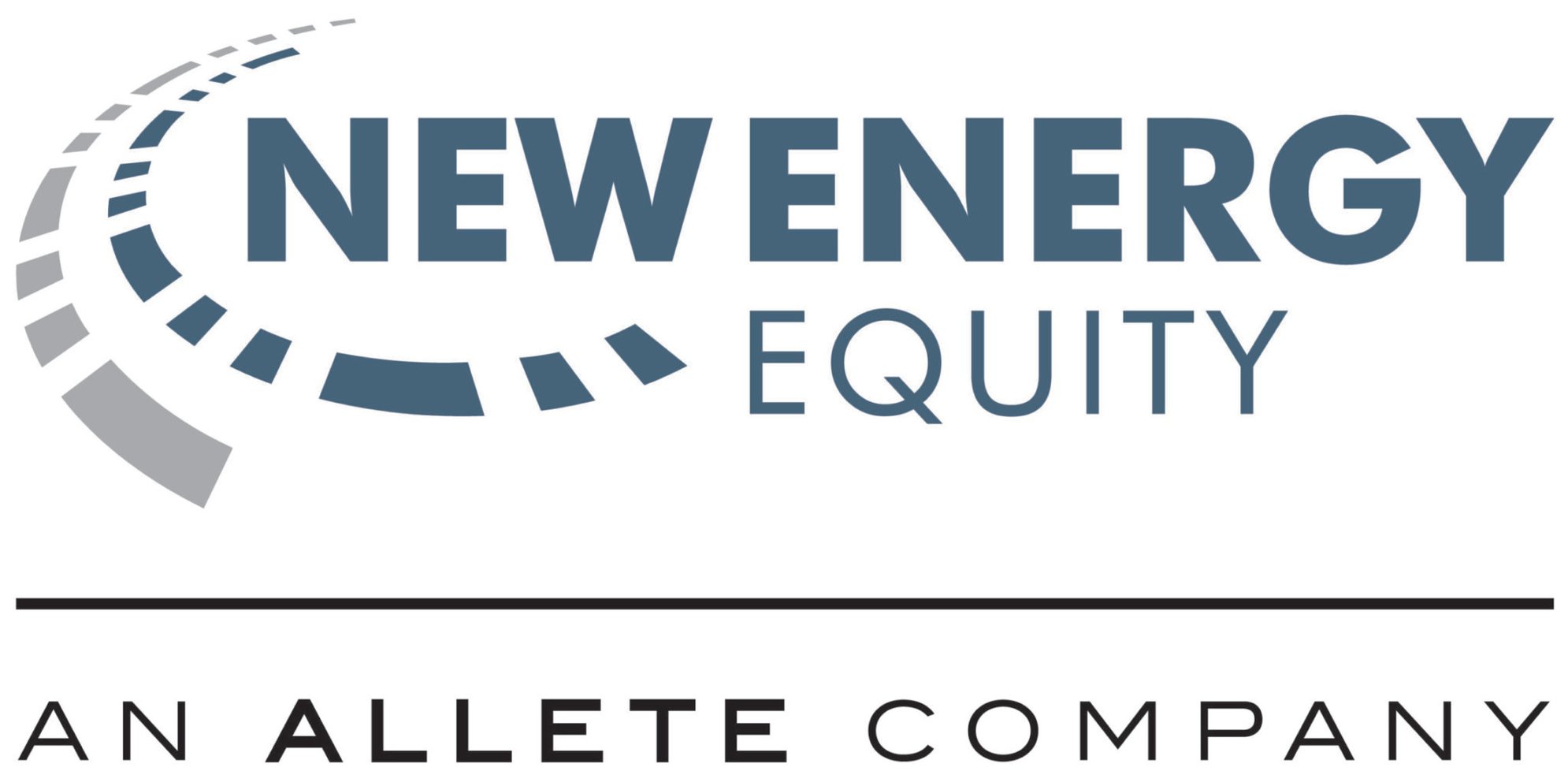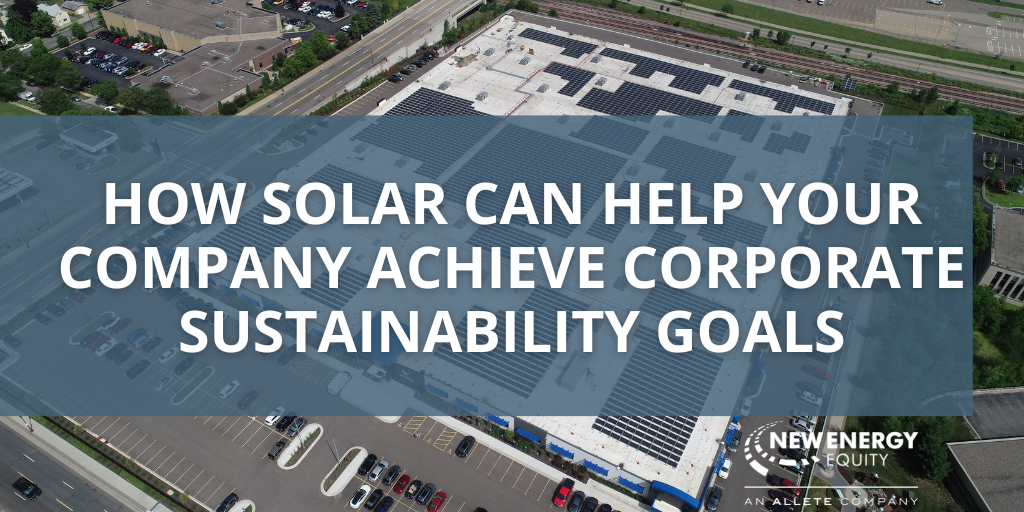New Energy Insights
- Home /
- New Energy Insights /
- How Solar Can Help Your Company Achieve Corporate Sustainability Goals
Many companies are turning to solar to achieve their corporate sustainability goals in response to shifting external factors, investor attitudes, and stakeholder preferences. With interest in corporate solar surging, we wanted to highlight recent examples of those external factors, show how solar can help, and illustrate how solar has helped our clients and collaborators achieve their goals.
What Is Corporate Sustainability?
As the Ivey Business Journal puts it, “Corporate sustainability recognizes that corporate growth and profitability are important, it also requires the corporation to pursue societal goals, specifically those relating to sustainable development — environmental protection, social justice and equity, and economic development.”
Unfortunately, many companies struggle to gauge the effectiveness of their programs. A survey of both public and private companies revealed that while 81% of respondents’ companies have formal programs in place, only 50% of those respondents believe their company performs effectively. Fortunately, solar can help companies produce substantial, measurable results for their corporate sustainability goals.
Environmental Protection
A United Nations report, approved by 195 governments and based on 14,000 studies, confirms that humans are responsible for climate change. While the results are unsettling, there is still hope to achieve the best outcome with a coordinated effort and swift policy change. Since solar energy systems do not produce air pollution or greenhouse gases, they can drastically reduce your organization's carbon footprint and are also an impactful way to advance your building’s green credentials. While your company may not influence policy, it can still take part in the coordinated effort to reduce greenhouse gas emissions.
Take The Vomela Companies’ on-site solar array as a recent example. The company is projected to offset nearly 36,000 tons of CO2 over the next 30 years, which will make a significant positive environmental impact. That’s the equivalent to adding 44,000 acres of trees to our forests. Additionally, the company achieved the sustainable green printing certification by pairing solar with other environmentally conscious practices.
 An Aerial View of The Vomela Companies' rooftop solar array in Saint Paul, Minnesota.
An Aerial View of The Vomela Companies' rooftop solar array in Saint Paul, Minnesota.
Social Justice and Equity
The senate passed the $1 trillion infrastructure plan, allocating $36 billion in investment to fight climate change. In the proposal it states that, “the plan prioritizes addressing long-standing and persistent racial injustice. The plan targets 40% of the benefits of climate and clean infrastructure investments to disadvantaged communities.”
According to the IEA, solar energy has surpassed all other forms of energy as the most affordable electricity source in the world. Despite this, disadvantaged communities have less access to solar energy and its benefits compared to their counterparts. As outlined by the Scientific American, ”Racial and ethnic minorities have less access to solar power, regardless of income, highlighting the need for environmental justice.” Providing these communities with access to cheap, clean energy is an actionable way for organizations to take part in both social and environmental change.
Look at Shiloh Temple’s rooftop community solar project as an example. Faith groups, businesses, and organizations across North Minneapolis banded together to create positive change. While other solar gardens are being developed to allow large corporations or municipal governments to subscribe, this garden demonstrates a new model by placing clean energy in a low-income community of color, creating green jobs for local residents, and ensuring access to community solar.
 Community members participating in Shiloh Temple's ribbon cutting event.
Community members participating in Shiloh Temple's ribbon cutting event.
Economic Development
In a statement by SEC chairman Gary Gensler, it was announced that plans are in development for mandatory climate reporting by the end of the year, signaling to publicly traded organizations that they should prepare to addressing environmental, social, and governance issues. Larry Fink’s 2021 annual BlackRock CEO letter said it best. “There is no company whose business model won’t be profoundly affected by the transition to a net zero economy.”
More than 17,212 solar jobs were added from 2020 through 2021, outpacing the US economy growth and 90% of newly installed electric capacity was from renewable sources in 2020. 'Solar installer' has been consistently ranked as one of the fastest growing jobs in the US in the past 5 years, according to the SEIA. Companies that meet their energy needs with rooftop solar are supporting economic development through manufacturing, installation, and more. Opportunities for companies to support economic development with solar are not limited to rooftop installations, either. Sourcing energy from community solar gardens provides economic support to rural communities, while giving farmers and landowners a valuable opportunity to diversify income streams.
In a collaboration with Summit Academy, Target Corporation, and the City of Minneapolis, New Energy Equity (previously Impact Power Solutions) led a workshop with Summit Academy grads and solar career hopefuls to help prepare them for NABCEP certification, the most well established certification in the renewable energy field. The New Energy Equity team shared their solar industry knowledge, the students received real world experience, and Target Corporation reinforced their commitment to renewable energy by supporting future renewable energy leaders.

Summit Academy grads, Target representatives, and New Energy Equity team members.
Consider Solar for Accomplishing Your Company’s Corporate Sustainability Goals.
If your company is looking for practical ways to achieve its corporate sustainability goals, we encourage you to evaluate solar. In addition to drastically reducing energy costs and carbon emissions, solar can compliment multiple company initiatives. Interested in learning more about what solar would look like for your company? Contact us to see if solar is right for you! We’ve been happy to learn about your energy needs, educate inquirers, and demonstrate solar's payback for over 30 years.
Stay up-to-date with New Energy Equity by joining our mailing list.

